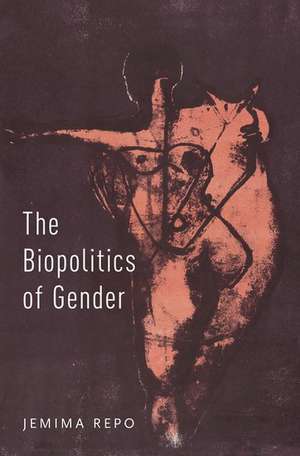The Biopolitics of Gender
Autor Jemima Repoen Limba Engleză Hardback – 29 oct 2015
| Toate formatele și edițiile | Preț | Express |
|---|---|---|
| Paperback (1) | 261.41 lei 31-37 zile | |
| Oxford University Press – 27 iul 2017 | 261.41 lei 31-37 zile | |
| Hardback (1) | 491.43 lei 31-37 zile | |
| Oxford University Press – 29 oct 2015 | 491.43 lei 31-37 zile |
Preț: 491.43 lei
Preț vechi: 544.41 lei
-10% Nou
Puncte Express: 737
Preț estimativ în valută:
94.05€ • 97.82$ • 77.64£
94.05€ • 97.82$ • 77.64£
Carte tipărită la comandă
Livrare economică 03-09 aprilie
Preluare comenzi: 021 569.72.76
Specificații
ISBN-13: 9780190256913
ISBN-10: 0190256915
Pagini: 232
Dimensiuni: 236 x 152 x 25 mm
Greutate: 0.48 kg
Editura: Oxford University Press
Colecția OUP USA
Locul publicării:New York, United States
ISBN-10: 0190256915
Pagini: 232
Dimensiuni: 236 x 152 x 25 mm
Greutate: 0.48 kg
Editura: Oxford University Press
Colecția OUP USA
Locul publicării:New York, United States
Recenzii
The Biopolitics of Gender is an illuminating and important study, which reconfigures many taken-for-granted assumptions about the notion of gender and its role in feminist theory as well as politics. It is essential reading not only for feminist scholars, but also for those engaged in the task of critiquing neoliberal power structures.
Given that gender is not a synonym for women, what then does it signify? How have feminist challenges to biological determinism become bureaucratized as capitalist biopolitics and state feminisms? In this provocative genealogical study of gender, Jemima Repo answers these questions and challenges us to unlearn what we think we already know.
In this groundbreaking reappraisal of both Foucault and feminism, Repo shows how gender became an apparatus for the regulation of life processes, and gender equality policy became embedded in governmental, bioeconomic projects to optimize population management. Such projects have, she argues, been fortified by feminism while also relying on disturbing differentiations between womens reproductive worth. Boldly arguing for a provisional suspension of all theories of gender, The Biopolitics of Gender assesses the distribution of inequality constitutive of gender equality.
Gender is a useful category for feminism. However, it is also an instrument of biopower. Gender is a double-edged sword both critical and normative. Jemima Repos powerful argument elaborates on Foucaults work to trace the genealogy of gender from the invention of the concept in a medical context in the 1950s through its feminist appropriation in the 1970s to contemporary neoliberal uses of gender equality. This original and important book thus turns the tables around: it makes trouble in gender studies, as feminist politics appear entangled in neoliberal biopolitics.
The importance of the questions raised, and careful attention paid to government gender deployments, renders this book invaluable to a vast inter-disciplinary audience. It cautions against accepting macro-level political efforts as non-normative and equal. More academics, especially in the humanities and social sciences, should consider the utility of the biopolitical framework. Repos work may be one of many methodological approaches, but is arguably one of the most robust and powerful in its theoretical breadth and substance.
Given that gender is not a synonym for women, what then does it signify? How have feminist challenges to biological determinism become bureaucratized as capitalist biopolitics and state feminisms? In this provocative genealogical study of gender, Jemima Repo answers these questions and challenges us to unlearn what we think we already know.
In this groundbreaking reappraisal of both Foucault and feminism, Repo shows how gender became an apparatus for the regulation of life processes, and gender equality policy became embedded in governmental, bioeconomic projects to optimize population management. Such projects have, she argues, been fortified by feminism while also relying on disturbing differentiations between womens reproductive worth. Boldly arguing for a provisional suspension of all theories of gender, The Biopolitics of Gender assesses the distribution of inequality constitutive of gender equality.
Gender is a useful category for feminism. However, it is also an instrument of biopower. Gender is a double-edged sword both critical and normative. Jemima Repos powerful argument elaborates on Foucaults work to trace the genealogy of gender from the invention of the concept in a medical context in the 1950s through its feminist appropriation in the 1970s to contemporary neoliberal uses of gender equality. This original and important book thus turns the tables around: it makes trouble in gender studies, as feminist politics appear entangled in neoliberal biopolitics.
The importance of the questions raised, and careful attention paid to government gender deployments, renders this book invaluable to a vast inter-disciplinary audience. It cautions against accepting macro-level political efforts as non-normative and equal. More academics, especially in the humanities and social sciences, should consider the utility of the biopolitical framework. Repos work may be one of many methodological approaches, but is arguably one of the most robust and powerful in its theoretical breadth and substance.
Notă biografică
Jemima Repo is Lecturer in the Politics of Gender at Newcastle University

















